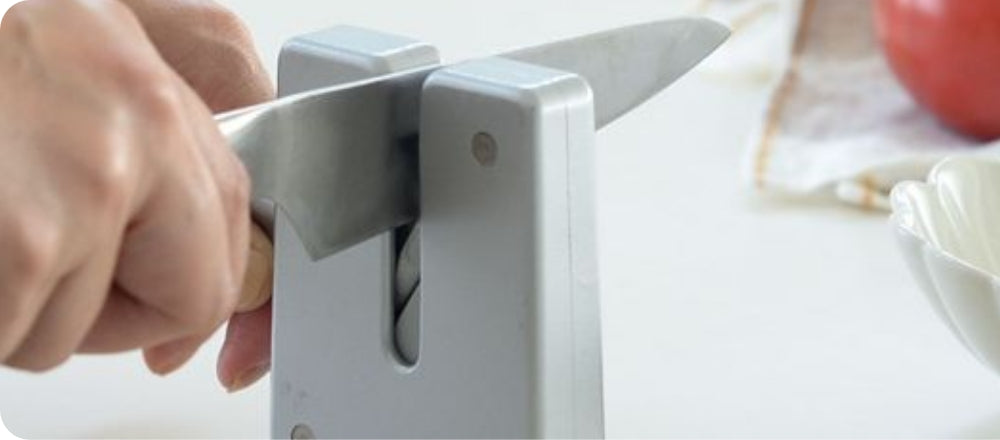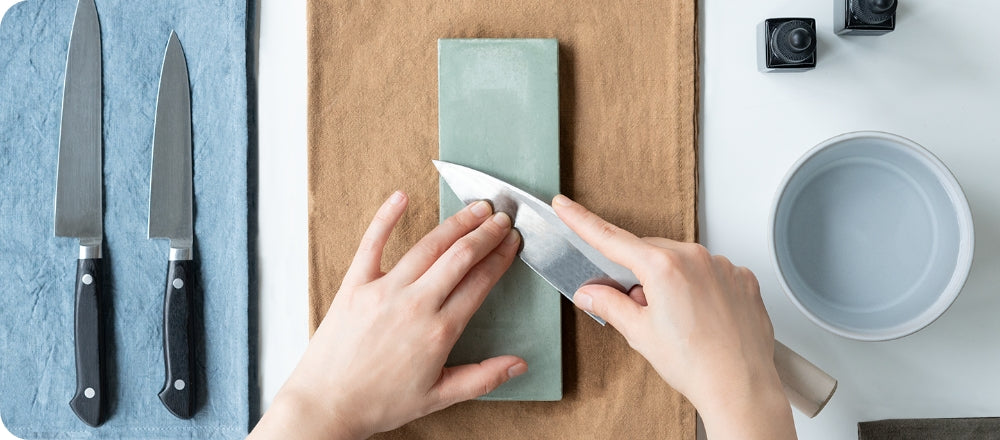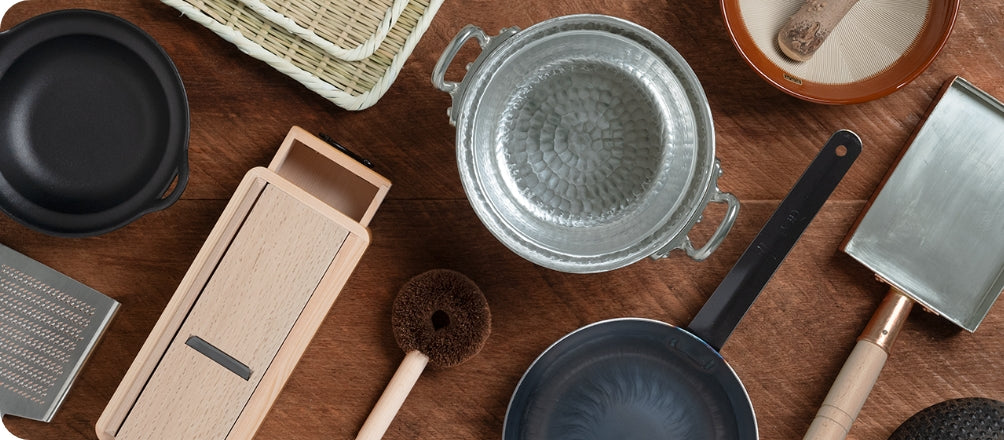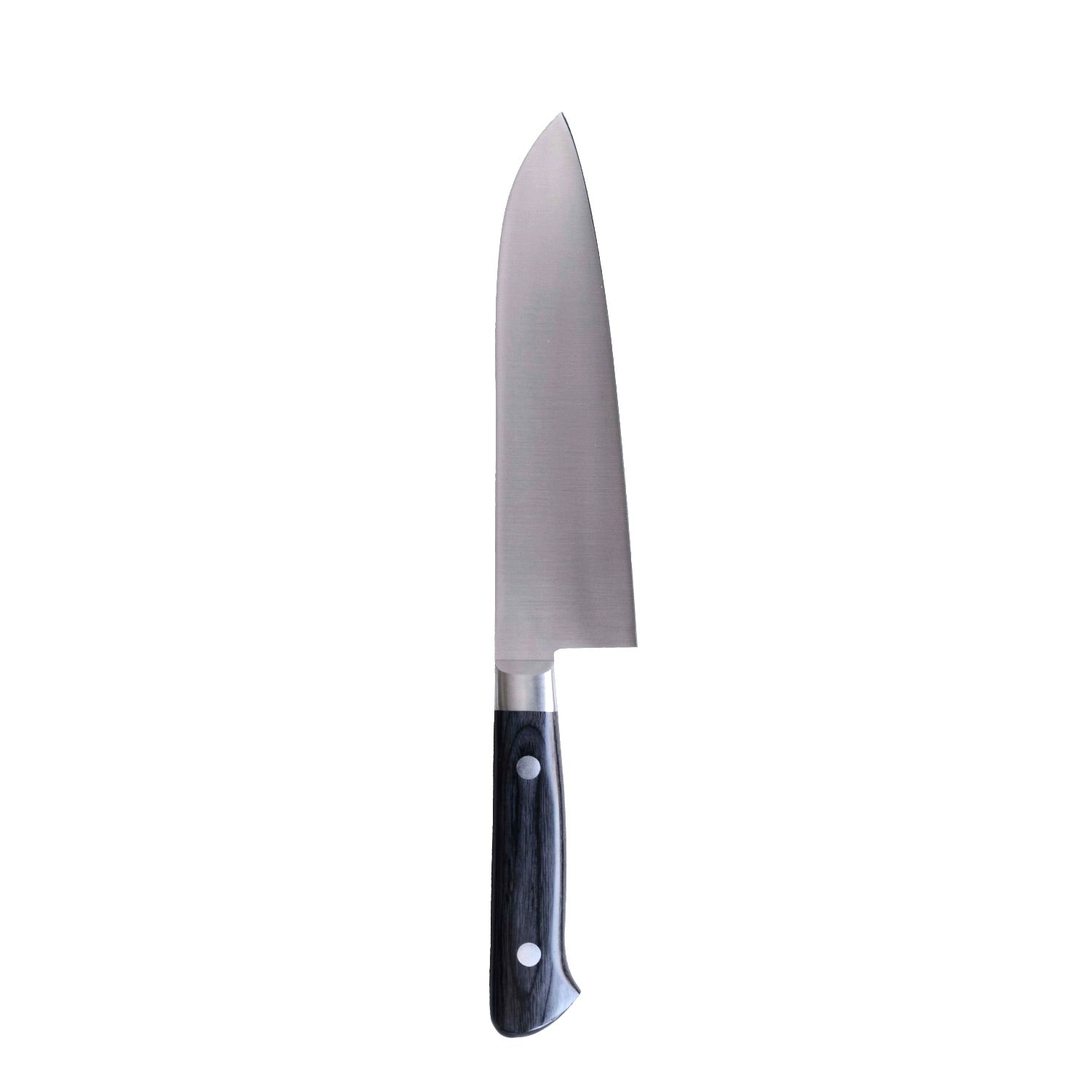
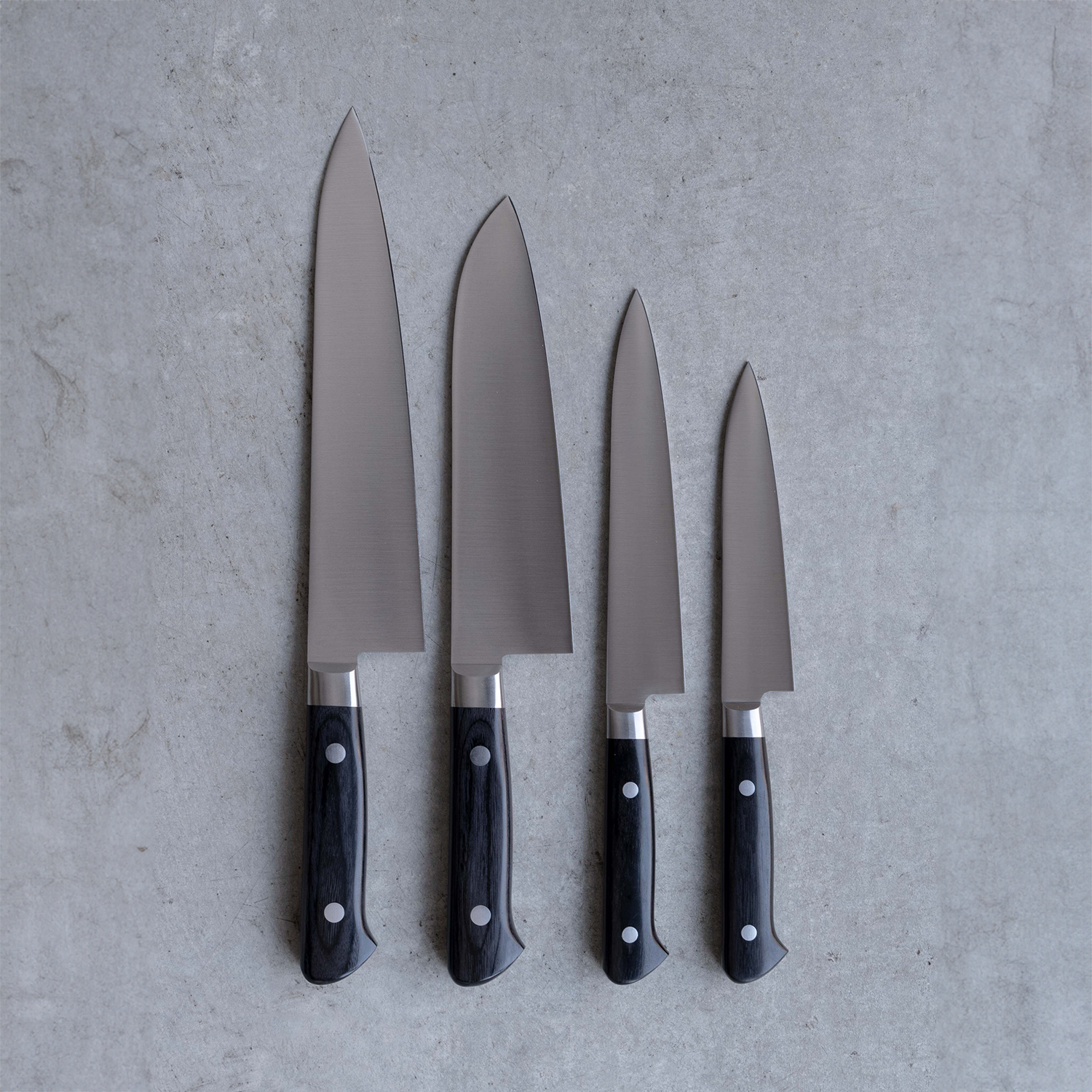
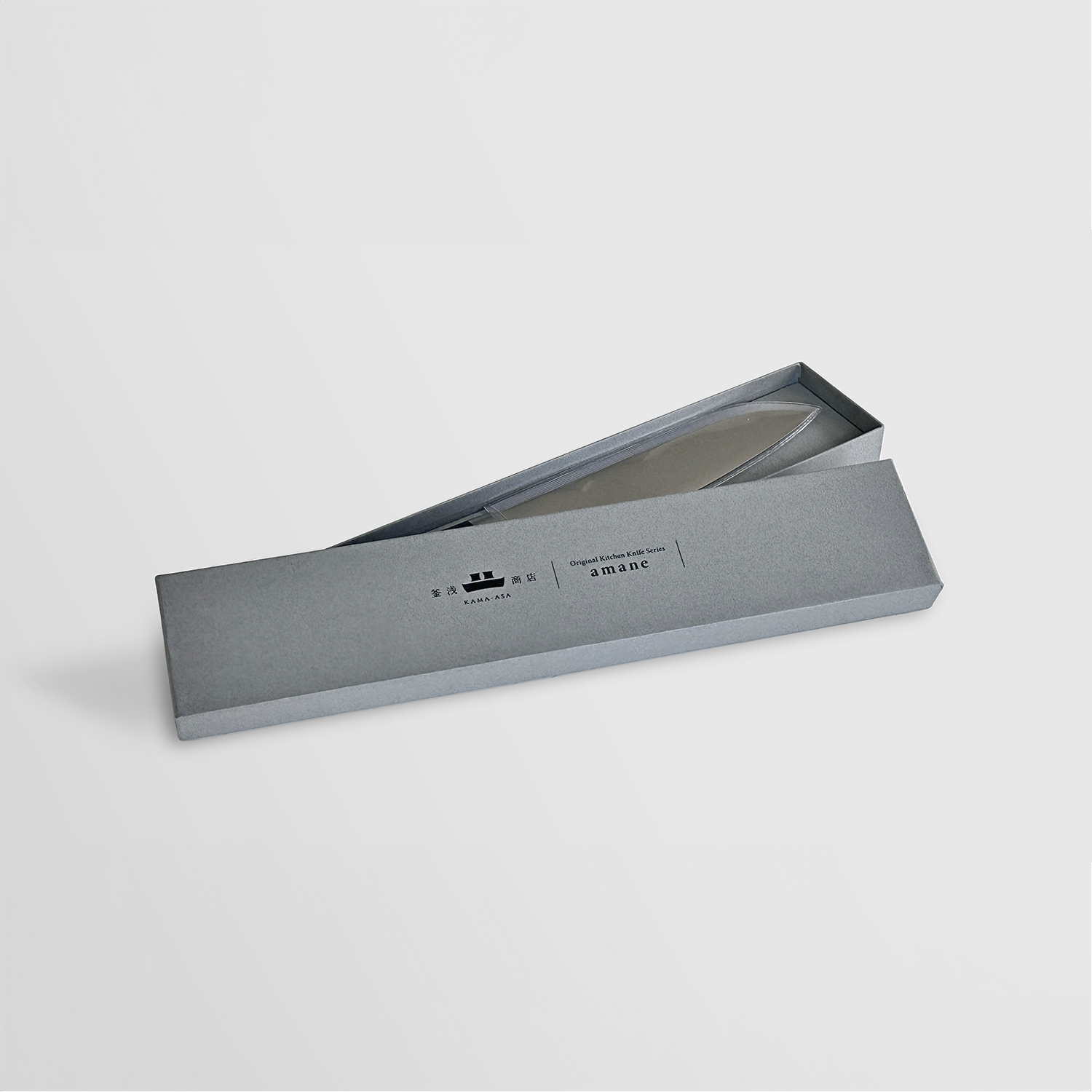
D amane VG10 SANTOKU
Caractéristiques du produit
Couteau polyvalent largement utilisé au Japon
Le Santoku est un couteau de cuisine polyvalent avec une lame droite pour couper une variété d'aliments, notamment la viande, le poisson, les légumes, etc.
Il a la forme d'une combinaison de Nakiri, traditionnellement utilisé au Japon pour couper les légumes, et de Gyuto (couteau de chef) utilisé à l'étranger comme couteau de cuisine polyvalent.
Le style de hachage, où le couteau est descendu de haut en bas, est courant au Japon, et le son « ton ton ton » entendu dans les foyers japonais est dû à cette habitude.
Fabriqué en acier VG10
Le VG10, un matériau en acier fabriqué avec une technologie de durcissement de haute précision, se caractérise par sa dureté élevée et son tranchant durable.
7 fonctionnalités clés
Acier inoxydable de qualité professionnelle
L'acier VG10 utilisé pour la lame est extrêmement dur et possède des propriétés similaires à celles de l'acier au carbone.
Afin de tirer parti de cet acier supérieur, Amane a trempé l'acier sans réduire sa dureté et a soigneusement éliminé les distorsions de la lame tout en acier, qui est sujette aux fissures.
Le couteau est ensuite soumis à un processus supplémentaire d'élimination de l'épaisseur à l'aide d'une pierre à aiguiser et est rempli de l'essence de l'artisanat.


Bord Hamaguri (convexe) avec une coupe lisse
Courbée en douceur de la colonne vertébrale vers le bord, la lame fine offre une coupe douce grâce à moins d'interruptions.
La lame est conçue pour maintenir la durabilité du bord et pour avoir une meilleure libération des aliments.
Acier monobloc pour un affûtage facile et un réglage de la lame adapté à la main de l'utilisateur.
La pointe de la lame est inclinée avec un rapport avant/arrière de 7:3, ce qui facilite son utilisation pour les droitiers (un modèle pour gauchers est disponible).
Les couteaux fabriqués à partir d'une seule pièce d'acier permettent un réglage facile de la lame en fonction des préférences de l'utilisateur.
Par exemple, il est possible d’affûter la lame pour lui donner une forme similaire à celle d’une lame à un seul tranchant, ce qui donne une lame plus tranchante.
De plus, l'amane, qui est soigneusement filtré lors du processus de fabrication, se caractérise par une sensation d'affûtage stable même après des années d'utilisation.


Poignée soigneusement conçue pour une prise en main facile
À la recherche d'une prise en main confortable, les poignées sont soigneusement polies encore et encore pour éliminer les espaces entre les pièces en métal et en contreplaqué, ce qui donne une finition brillante et arrondie extrêmement confortable dans la main.
Il peut être utilisé pendant de longues périodes sans stress sur la main saisie et est recommandé aux personnes ayant de petites mains.
La poignée est un détail subtil qui ne se remarque que lorsque vous la tenez, mais c'est une poignée qui est remplie de soin pour l'utilisateur.
Traversin en acier inoxydable hygiénique et durable
L'ajout d'une mitre entre la lame et le manche empêche l'eau de s'infiltrer dans le manche, le rendant ainsi plus hygiénique et résistant aux dommages. Cela améliore la durabilité globale du couteau.
De plus, le traversin est fabriqué en acier inoxydable résistant à la rouille, ce qui aide à prévenir les taches et l'accumulation de saleté, garantissant une propreté et une durabilité durables.


Logo de la marque KAMA-ASA
Le logo KAMA-ASA, apposé au dos de la lame, témoigne de notre engagement envers l'originalité. Il symbolise le savoir-faire et le dévouement uniques, exclusifs à KAMA-ASA.
Fujitake des couteaux de cuisine à Seki-shi, préfecture de Gifu, Japon
Le produit a été développé en coopération avec « Fujitake Kitchen Knives », un fabricant situé à Seki-shi, dans la préfecture de Gifu, qui possède le plus grand volume de production de couteaux au Japon.
Ils sont l'une des rares entreprises de Seki-shi à réaliser la majeure partie du processus de fabrication des couteaux (affûtage, élimination des contraintes, finition, fixation du manche, etc.) en interne.
La qualité de leurs produits est très appréciée non seulement par le grand public mais aussi par les chefs professionnels, tant au niveau national qu'international.

Notes

Détails du produit
Caractéristiques
- Dimensions
- Longueur totale 300 mm / Longueur de la lame 175 mm
- Poids
- g
*Le poids des couteaux peut varier légèrement. - Biseau du couteau
- Double biseau
- Main dominante
- droitier
- Processus de fabrication
- Pressé
- Structure de la lame
- couche unique
- Forgeron
- -
- Aiguisoir
- -
- Matériels
- Matériau de la lame : acier inoxydable VG10
Matériau du manche : Bois composite
Précaution
- NE PAS passer au lave-vaisselle.
- Pour éviter la rouille, essuyez soigneusement le couteau après le lavage.
- Veuillez lire les instructions avant utilisation.
Gravure
Un couteau précieux rien que pour vous.
KAMA-ASA inscrira votre nom sur vos couteaux.
- *Il existe des restrictions sur la police et le nombre de lettres en fonction du type de couteau.
- Notation japonaise et katakana dans les 10 caractères

- Notation alphabétique (écrite) dans les 20 caractères

FOIRE AUX QUESTIONS
Pour l'instant, nous n'offrons pas ce service en France car nous n'avons personne pour le faire dans la boutique parisienne. Notre collègue de la boutique de Tokyo vient parfois en France et est en mesure de faire des gravures, cependant nous n'avons pas les dates précises de ses venues. Si vous tenez absolument à faire graver votre couteau, nous pouvons vous aider à passer votre commande au Japon. Dans ce cas, veuillez nous donc contacter via le formulaire de contact avant d'acheter votre couteau.
La plupart des éclats de lame de couteau peuvent être réparés par un aiguisage régulier. N'hésitez pas à nous en parler en boutique. Nous pouvons également accepter les réparations à distance, mais dans ce cas, les frais de livraisons sont à votre charge. Les prix varient en fonction du type de couteau, de la longueur de la lame et de l'état. Veuillez donc apporter votre couteau en boutique ou nous contacter à l'aide du formulaire de contact.
Veuillez noter que des éclats peuvent se produire lorsque vous coupez des aliments durs tels que des os, des graines et des aliments congelés, ou si le couteau tombe ou se coince dans une planche à découper dure.
Les couteaux vendus par KAMA-ASA peuvent être réparés, sauf dans certains cas, tels que des dommages irreversibles. La réparation et l'élimination de la rouille redonneront au couteau son tranchant et vous permettront de l'utiliser plus longtemps. Dans le cas de couteaux achetés dans d'autres magasins, il se peut que nous ne soyons pas en mesure d'en réparer dont le matériau de la lame est inconnu. En général, nous acceptons de réparer des couteaux en métal qui peuvent être aiguisés à l'aide d'une pierre à aiguiser, mais nous ne pouvons traiter la reparation de couteaux en céramique.


